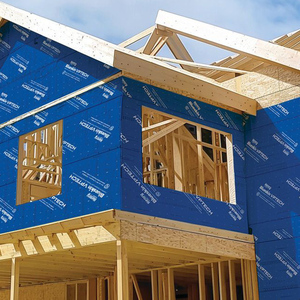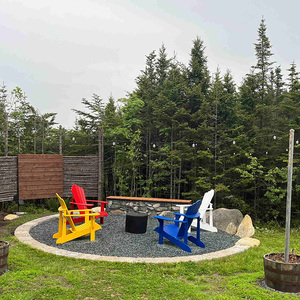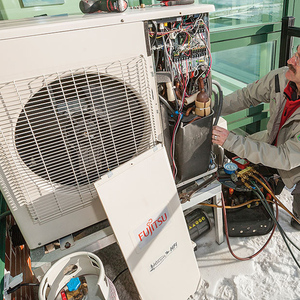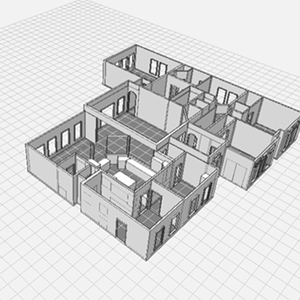Hi,
I have a D25213k – Dewalt 8am 2.5ft pound rotary hammer – and the spec rates it at a max drilling capacity of 3″ for a thin wall core bit.
I have some diamond core bits but I don’t know if they would qualify as thin walled – how thin is thin?. I want to drill at 2.5″ hole through a 8″ concrete wall.
If I entered from both sides using the pilot I’d be at 6″ of the 8″.
Do I need a more powerful drill or will my drill be able to handle the occasional drilling of this sort of hole? How do they determine the max drilling capacity? Where does the problem lie in going beyond the max, is it the strain on the motor?
Thank you,
learner



















Replies
Not too much help I guess but we recently had some drilling done by the guys that do just that.
I was gonna pilot a hole for them (stone, 12" thick) and they said empaphically NO...the water won't stay in the bore.
I think you need a 10" deep bit and keep it wet, but your drill motor should be able..hitting rebar might make for a long day tho'. I'd drill from one side only..depending on how pretty that bore has to line up...we went 10" diam. and in limestone, it took less than 2 mins per hole, and it was NOT a hammer drill, hammer is for carbide as I understand, diamond is rotary only.
Spheramid Enterprises Architectural Woodworks
Repairs, Remodeling, Restorations
They kill Prophets, for Profits.
Thanks for the reply.Concrete is 1920 special - no rebar.Rotary hammer has drill mode and yeah I wasn't planning on using hammer mode with my diamond core bits but your point is well received =)The bits themselves say wet or dry - since the hole is parallel to the ground keeping water in the bore would be quite difficult. I could tap a hose above it or something though.My bits are ~3" deep but I have bit extenders for them. Why do you think I need a 10" deep bit? Do you think it will be hard to crack the 3" segment of core out? I figure 3" then crow bar out the segment, lather, rinse, repeat.Hole is for 200 amp wire feed to panel so it doesn't have to be that pretty.
They might SAY wet OR dry, but if you value your time and your bit, you want water flowing.The water does several things. It cools the cutting teeth and the steel.It carries the debris away so the edge can keep cuttingit keeps dust downIt lubes the sides of the hole and bit wallso without ware, you breathe dust while overheating the sides while overworking the drill motor and over heating it. meanwhile because the debris is built up on the cutting edges, you are overworking and over heating the 'teeth' and not making much progress. You punish yourself and your tool for it all. I might cut a ceramic tile 3/8" with a dry bit at most.
Welcome to the Taunton University of Knowledge FHB Campus at Breaktime. where ... Excellence is its own reward!
Good point. Maybe I'll tap a pop bottle to the wall above the bore site and have a pin hole leak water on to my bit. See what I can jury rig up.Thanks for the advice.
real core guys use a small pump to keep the water clean, it flushes the frass more better.
One hole, I'd say go for it, and plan on a bit )$$$$$(.
Just to get level, I rented the same drill and almost the same bit just a few months ago..old 1920 foundation up into a milk house..no dice, I used the smaller Bosch w/a flat chisle..and it took a bit longer than we planned,,same job BTW.
Rental core bits CAN be useless ( as in our case) and if prove so, can be returned w/out charge....I chipped the day away instead on that hole, @ 50.00 an hour.
By the time the Genius H.O. Drove and paid, and returned the tool, I was done with tge Bosch Bulldog.
So its a judgement call of use over time divided by the squared sum of rental added to the guy's pay going for the tool multiplyed by hourly rate and getting it back on time to avoid 2x that...;That is why WE are not you, and I'll send an apologie for that right now, so as to appease your feelings, but sometimes, PLEASE contact a Bro in the Fro..wee need work too.
WE have the tools, and the ability to discern when you need better help..we are here for you...let us do our jobs.
We are here for you.Spheramid Enterprises Architectural Woodworks
Repairs, Remodeling, Restorations
They kill Prophets, for Profits.
Thanks for the advice.I put the 6" depth bit to work for about 30minutes and I've got about 3+1/2" deep. Another couple hours should do the trick. I should have started on the outside then I could have drilled in 3" and just used my demo hammer to pound through a rough hole on the other side. Probably doesn't matter too much how rough the hole is might even be better rough if I pack the ele conduit with hydraulic cement after I finish. Maybe I'll score the sides of the cut to give the hydraulic cement a better grip.The ele quoted me the rental cost for the drill and bit and I am paying him by the hour so given I have diamond core bits and a 1" rotary hammer rather than pay him the big bucks and rental fees to drill the hole I figure I'll either use my gear and finish the hole or let him finish the hole using my gear. I just want to make sure my gear is still in good working order after he finishes.I do hire a lot of stuff out I am just not sure it makes sense to hire out a single hole. A specialty concrete cutting/coring company would likely charge me at least $300 to get them out and have the hole drilled - though probably cheaper than having the ele drill it after I factor in time to the rental place, rental cost and his time drilling it. learner
Another couple hours should do the trick.
Core drilling specialist would have had it done in about 1 hour total. Cost about $200 for a local core driller around here.
not sure the question, or if it was answered, are you thinking there should be a "cup drill" 10" deep? .. yes they exist, but most of us just drill a couple of inches, nock out the conc plug, drill a couple more inches, nock out the conc plug .... it breaks out real easy with a chisel and hammer ..
I've witnessed two local outfits, the first had all hydraulically opereated spinners, and the second was electric.
Both were impressivly fast. But both were in limestone foundations, I can see old concrete with rebar being a PITA.
I had rented a bigazz Bosch w/ a 4" dia core drill for 28 $ a half day not too long ago..the bit was so trashed it was nothing but a waste of time...I drilled and whacked and drilled and whacked with my bulldog and a chisel bit. It was on that big ele. install we did last fall, getting an LB in a milkhouse that was poured in the teens.Spheramid Enterprises Architectural Woodworks
Repairs, Remodeling, Restorations
They kill Prophets, for Profits.
Bluegrass Concrete Coring and Cutting were the guys we used on our last job. They put two 4" holes through 14" loading dock wall in less than an hour of actual drilling. It took an additional hour of setting quickbolts, mounting plates and such for the vertical bore. Cut through rebar and old concrete made with river rock like sliced bread.
They work all over the state if you ever need them.
I can't recall the other outfit we used, but they were good too. They did about 15-20 six and eight inch holes in the floor of our data center, beneath the raised panel floor, and never even got a beep out of our water detection system, and only one pre-alarm from the under floor smoke detectors. They didn't even rig a stand for the big hummin drill. One guy just snugged it up between his boots and started drilling. A second guy sprayed the bit from a big garden sprayer type pump, and the third guy kept a wet vac. sucking up the water. A fouth guy was downstairs underneath each core with a five gallon bucket to catch the plug and any water.
Google Dynatech. Used their core drills in the past with excellent results. To get the hole started, drill a same size hole in 2X material to use it as a guide. Once the hole is started in the concrete, you can remove the 2X and drill directly into the concrete. I think their core drills are about 18" long.
Interesting !Thank you for the link.Looks like based on the video my 1" sds should be more than capable of drilling using the 2.5" diameter core bit.The general advice seems to be drill at a high speed with light pressure - finger tip - and for holes under 4" diameter an angle grinder can achieve a higher rpm and better performance than a rotary drill. Holes larger than 4" or with rebar should be drilled at a slower speed. Too bad they are a light value with high and low speed.